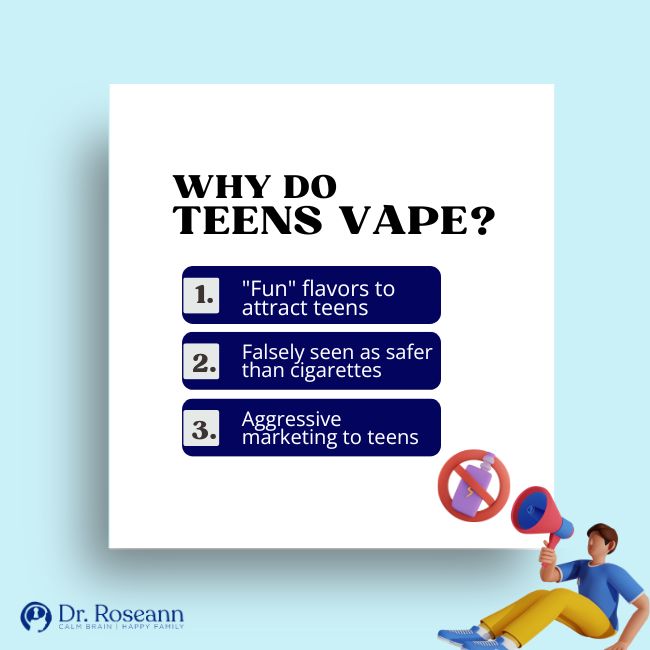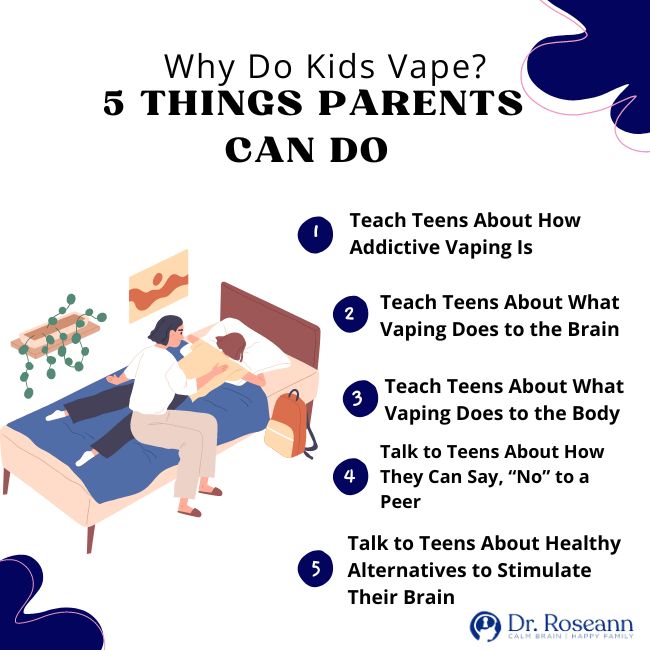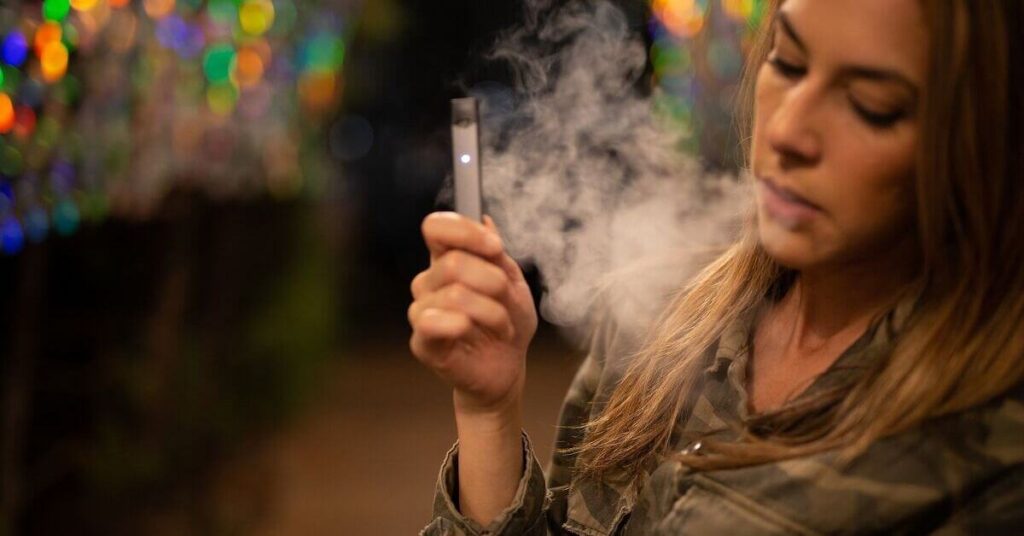Common in today's world to see teens and adults vaping, an increasingly popular alternative to smoking. The latest craze has many forms, including e-cigarettes mimicking the reviled tobacco cigarettes, vape pens shaped much like classic fountain pens, and even advanced personal vaporizers, which come in many forms. Some resemble miniature flasks, while others are shaped much like an over-large thumb drive. But why do teens vape?
Vaping, for those unfamiliar with it, is the inhaling of aerosol through devices. The practice gained popularity in 2007, and it's become increasingly common despite growing concern of the health impact of inhaling the fine particles and varying amounts of toxic chemicals often found in the aerosol.
Ostensibly labeled the “healthy” alternative to smoking, the lack of cigarette or marijuana smoke belies the health hazards linked to vaping including but not limited to cancer, respiratory and heart disease.
There are a lot of reasons why parents should be concerned about vaping but understanding why your teen is hooked can help you tackle both the issue of vaping and the underlying cause with your teen.
Why Do Teens Vape?

Teens think vaping is cool for a lot of reasons. Appealing packaging and all the fun flavors are a big part of the attraction. Teens believe it isn’t as bad as smoking due to how manufacturers and distributors promote it. Some even added essential oils, implying that vaping is harmless and “healthy.” So young people give it a try without realizing how addictive it is.
Vapes are commercially positioned as an alternative to smoking a tobacco product and are often touted as a way to give up the nasty habit of cigarettes. This has led to the false belief that vaping is less dangerous, which leads teens to see it as the safer option.
Social media marketing is aggressive and targeting the desire to look cool while implicitly claiming to be a better alternative to smoking. According to the US Centers for Disease Control and Prevention (CDC), high school students' use of e-cigarettes (also known as vaping) jumped 78% from 2017 to 2018 (Simon, 2018).
Nicotine is Addictive
Despite all the fun flavors and “natural essential oils”, vapes still have a ton of nicotine in them making them highly addictive. In a 2017 research published in JAMA, E-cigarettes were found to contain higher concentrations of nicotine than regular cigarettes (Goldenson et al., 2017).
Nicotine is a stimulant which activates the reward centers of the brain. This results in an increase in the neurotransmitter dopamine, which is responsible for feelings of pleasure and well-being.
According to a Truth Initiative study, e-cigarette users were seven times more likely to become smokers one year later than non-users (Hair et al., 2021).
Peer Pressure and Vaping
Navigating peer pressure is a normal part of teen development. Every generation of teens wades through the issue de jour of their time. Some teens are more adept at avoiding the common pitfalls than their peers.
The problem with vaping is that public perception and heavy marketing have normalized it as a safer alternative to cigarettes. Teens lack the facts to argue the health hazards so they try it because all the other kids are doing it. In no time, they are hooked, addicted to the high nicotine levels and lulled by the false impression of its safety.
Drug Experimentation and Vaping
Teens have long experimented with alcohol and drugs but over the years these vices have acquired a stigma. Vaping has been destigmatized thanks to carefully seeded implications of being harmless. So, while drinking alcohol may be frowned upon, vaping in the school bathroom has become pretty commonplace.
Self-Medicating and Vaping
The term self-medicating is used when substances, food, drugs or alcohol, are over-used or abused to self-treat or mask symptoms of a mental health issue. Self-medicating an issue is problematic for many reasons.
Aside from the possibility of overusing a substance, there is the very real danger that a person isn’t getting the right kind of help for their individual needs. If your teen is vaping, consider whether they may be self-medicating to deal with stress, focus issues, anxiety, depression, or some other struggle.
Why Do Kids Vape? 5 Things Parents Can Do

Just because so many teens are vaping, doesn’t mean that you can’t have a positive influence on what your teen is doing. Talk to them is always the first step. Educate them about the health facts of vaping. Take time to listen to what they are worried about even if they don’t participate in vaping. Your positive influence on them may result in their positive influence on a friend.
Teach Teens About How Addictive Vaping Is
Dispel the false image of vaping as a healthy alternative. Let them know they are still inhaling nicotine and discuss with them the highly addictive properties of nicotine. Make sure they realize that once they are addicted, it will be a hard and painful habit to break.
Cravings can be powerful and addiction can begin within a few weeks of use. And if they are addicted, talk to them about what they can do to break that addiction, including getting help from a licensed therapist.
Teach Teens About What Vaping Does to the Brain
Teens brains are developing which means they are highly sensitive to chemical substances. In particular, the frontal lobes are delicate and continue developing until around the early twenties. Contact with dangerous substances during this critical development period can reduce activity in that region. This means that planning, working memory, multi-tasking and a host of other important skills can all be impaired.
Teach Teens About What Vaping Does to the Body
Vaping carries the risk of serious physical illness. Across the US, a few hundred vapers have developed a life-threatening lung illnesses. Centers for Disease Control and Prevention (2020) reports twelve deaths have already been attributed to vaping and e-cigarette usage.
Talk to Teens About How They Can Say, “No” to a Peer
Open up the dialogue about why kids are vaping and check in with your teen about their choices and worries. We like to think saying, “No” to unhealthy choices is simple but with teens there are layers of social consequences.
The risks of “going against the crowd” are amplified in a world perpetually connected through social media. Listen, validate, educate, and leave the door open for regular conversation. Teens are working through a process of differentiating themselves as individuals.
Learning to be increasingly independent of parents is tough, so you want to make sure you empower your teen to make healthy choices while at the same time acknowledging what they have to socially navigate through.
Talk to Teens About Healthy Alternatives to Stimulate Their Brain
Thankfully, there are many ways to naturally increase focus. They are things that teens can do for themselves that have a proven positive impact on health and well-being.
- Anti-Inflammatory Diet
- Exercise
- Chocolate
- Vitamin B 12
Discover the transformative power of our BrainBehaviorResetTM Program to address teen vaping and e-cigarette addiction. Reach out so we can help parents and teens navigate through this challenge. With both in-office and virtual coaching, we can provide expert guidance on various issues, including vaping addiction, and ensure a brighter future for your teen.
Parent Action Steps
- Learn about the psychology of vaping to understand its impact on teens
- Discuss your concerns with a mental health professional for guidance and support
- Use healthy alternatives to stimulate the brain
- Download the 147 Therapist-Endorsed Self-Regulation Strategies for children
- Optimize your child's treatment with the Solutions Matcher for personalized solutions
Citations
Centers for Disease Control and Prevention. (2020, February 25). Outbreak of Severe Pulmonary Disease Linked with E-cigarette Product Use. Centers for Disease Control and Prevention; CDC. https://www.cdc.gov/tobacco/basic_information/e-cigarettes/severe-lung-disease.html
Goldenson, N. I., Leventhal, A. M., Stone, M. D., McConnell, R. S., & Barrington-Trimis, J. L. (2017). Associations of Electronic Cigarette Nicotine Concentration With Subsequent Cigarette Smoking and Vaping Levels in Adolescents. JAMA Pediatrics, 171(12), 1192. https://doi.org/10.1001/jamapediatrics.2017.3209
Hair, E. C., Barton, A. A., Perks, S. N., Kreslake, J., Xiao, H., Pitzer, L., Leventhal, A. M., & Vallone, D. M. (2021). Association between e-cigarette use and future combustible cigarette use: Evidence from a prospective cohort of youth and young adults, 2017–2019. Addictive Behaviors, 112, 106593. https://doi.org/10.1016/j.addbeh.2020.106593
Simon, S. (2018, November 21). FDA Proposes Regulations as Teen E-Cigarette Use Skyrockets 78% in 1 Year. Www.cancer.org. https://www.cancer.org/cancer/latest-news/fda-proposes-regulations-as-teen-e-cigarette-use-skyrockets-78-percent-in-1-year.html
Always remember… “Calm Brain, Happy Family™”
Are you looking for SOLUTIONS for your struggling child or teen?
Dr. Roseann and her team are all about solutions, so you are in the right place!
There are 3 ways to work with Dr. Roseann:
You can get her books for parents and professionals, including: It’s Gonna Be OK™: Proven Ways to Improve Your Child’s Mental Health, Teletherapy Toolkit™ and Brain Under Attack: A Resource For Parents and Caregivers of Children With PANS, PANDAS, and Autoimmune Encephalopathy.
If you are a business or organization that needs proactive guidance to support employee mental health or an organization looking for a brand representative, check out Dr. Roseann’s media page and professional speaking page to see how we can work together.
Dr. Roseann is a Children’s Mental Health Expert and Therapist who has been featured in/on hundreds of media outlets including, CBS, NBC, FOX News, PIX11 NYC, The New York Times, The Washington Post,, Business Insider, USA Today, CNET, Marth Stewart, and PARENTS. FORBES called her, “A thought leader in children’s mental health.”

She is the founder and director of The Global Institute of Children’s Mental Health and Dr. Roseann Capanna-Hodge. Dr. Roseann is a Board Certified Neurofeedback (BCN) Practitioner, a Board Member of the Northeast Region Biofeedback Society (NRBS), Certified Integrative Medicine Mental Health Provider (CMHIMP) and an Amen Clinic Certified Brain Health Coach. She is also a member of The International Lyme Disease and Associated Disease Society (ILADS), The American Psychological Association (APA), Anxiety and Depression Association of America (ADAA) National Association of School Psychologists (NASP), International OCD Foundation (IOCDF) International Society for Neurofeedback and Research (ISNR) and The Association of Applied Psychophysiology and Biofeedback (AAPB).
© Roseann-Capanna-Hodge, LLC 2023
Disclaimer: This article is not intended to give health advice and it is recommended to consult with a physician before beginning any new wellness regime. *The effectiveness of diagnosis and treatment vary by patient and condition. Dr. Roseann Capanna-Hodge, LLC does not guarantee certain results.













